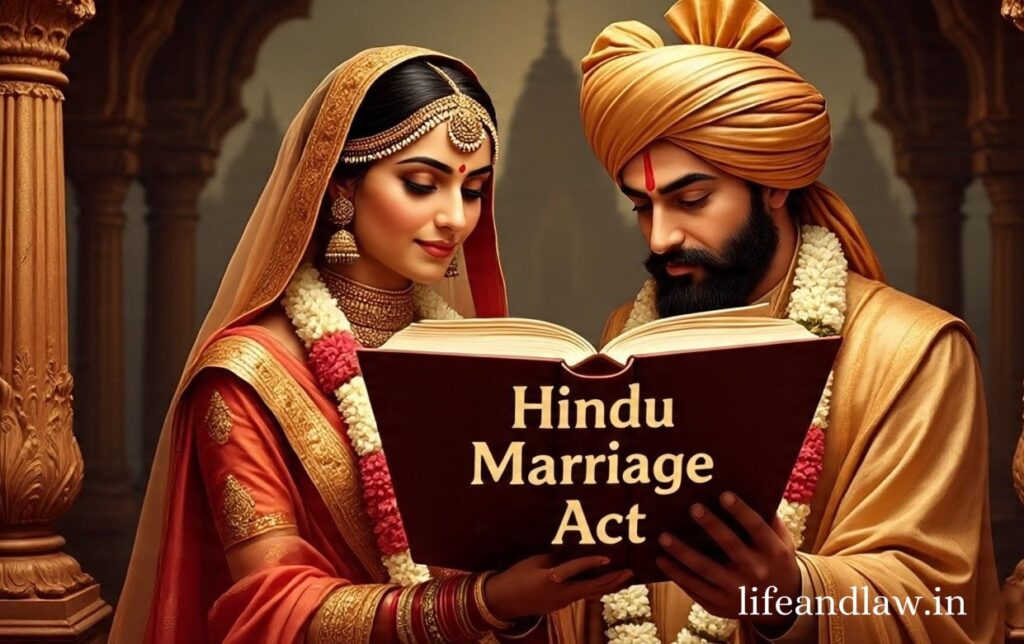Trending

Marriage is more than just a connection between two people; it’s a spiritual bond between two families. Marriage is important in Indian culture for religious and social reasons, and it is also governed by law. Specifically, the Hindu Marriage Act of 1955 establishes the norms, conditions, and rights associated with marriage for Hindus. This statute fully defines several issues, including marriage registration and divorce.
Many people focus solely on the social or religious aspects of marriage, but it is also critical to grasp the legal procedures, rights, and duties involved. The purpose of this article is to clarify, in simple terms, the key provisions of the Hindu Marriage Act that every Hindu individual should be aware of before marrying.
The Hindu Marriage Act of 1955 only applies to Hindus, Buddhists, Jains, and Sikhs. This law applies to anyone, regardless of caste, who follows the Hindu religion. It applies to both Hindus living in India and Hindu citizens living outside of India. Even in inter-caste marriages, if both parties are Hindu, the marriage is recognized lawful under this Act.
Section 5 of the Hindu Marriage Act explains the necessary elements for a marriage to be legally lawful. The following conditions must be met:
Consent:
It is critical that both the bride and groom freely consent to the marriage. The marriage must be performed with the complete consent of both parties. There should be no compulsion, deception, or psychological pressure involved.
Minimum Age:
The Hindu Marriage Act requires the husband to be at least 21 years old, while the bride must be at least 18 years old. A marriage involving people under this age limit is not deemed valid.
Mental Capacity:
Individuals getting into marriage must be of sound mind. That is, both the bride and groom must have the mental capacity to comprehend the nature of the marriage and participate in it. A person suffering from a mental condition or insanity is ineligible for a legitimate marriage under this law.
Existing Marriage:
If the bride or groom had a previous marriage, it must have been officially dissolved. Any current marriage that has not resulted in a lawful divorce renders a second marriage invalid under the Hindu Marriage Act.
Prohibited Relationship:
The bride and groom should not be involved in banned ties, such as close blood relations or the same gotra (clan). Marriages inside certain relationships are deemed unethical and invalid under Hindu norms.
A Hindu marriage can be solemnized using either party’s customary rites and customs. When these rites involve the Saptapadi, or the bride and husband walking seven sacred steps together around the holy fire, the marriage is complete and legally binding. The marriage is deemed fully solemnized once the seventh step is taken.
To assist the evidence of Hindu marriages, the State Government may establish guidelines for the registration of all required information in a Hindu Marriage Register. The State Government will define how the registration will be done and under what conditions.
This clause allows the State Government to decide whether Hindu marriage registration should be mandatory, or merely in select locations or instances. Non-compliance with stated guidelines can result in a punishment of up to rupees 25. All such rules will be laid before the respective State Legislative Assembly in due course.
The Hindu Marriage Register will be available for view at any time and can be used as proof of the marriage. Similarly, authenticated extracts from the record shall be available upon application to the Registrar for a prescribed price.
Void Marriages (Section 11):
If a marriage is performed in violation of clauses (i), (iv), and (v) of Section 5 of the Hindu Marriage Act, it is declared void. This means that the marriage is legally illegitimate, and either partner can submit a court petition to have it declared null and void.
These infractions include:
Voidable Marriages (Section 12):
A voidable marriage is one that remains legally valid until it is annulled by a court. Either partner may seek to have such a marriage annulled for particular grounds, including:
(a) The marriage was not consummated due to the incapacity of either party (whether physical or genetic).
(b) The marriage breached Section 5’s clause (ii), which states that one of the parties was of unsound mind or incapable of providing lawful consent.
(c) Consent to marry was obtained by deception or coercion.
(d) At the time of the marriage, the respondent (bride) was already pregnant by someone other than the petitioner, which he was unaware of.
However, regardless of the restrictions of this section, the legitimacy of a Hindu marriage will not be jeopardized simply because it is not recorded.
Legal practitioner Adv. Abdul Mulla enlightened these crucial sections of the Hindu Marriage Act, 1955, such as sections 5, 7, and 12, give critical clarification on the legitimacy, conditions, and legal ramifications of Hindu weddings. Understanding this enables couples and families to make educated decisions and avoid potential legal complications.
Readers can get more information and legal support on author’s websites, www.asmlegalservices.in and www.lifeandlaw.in, which provide useful resources on family and other laws.
Adv. Abdul Mulla (Mob. No. 937 007 2022) is a seasoned legal professional with over 18 years of experience in advocacy, specializing in diverse areas of law, including Real Estate and Property Law, Matrimonial and Divorce Matters, Litigation and Dispute Resolution, and Will and Succession Planning. read more….
Copyright BlazeThemes. 2025